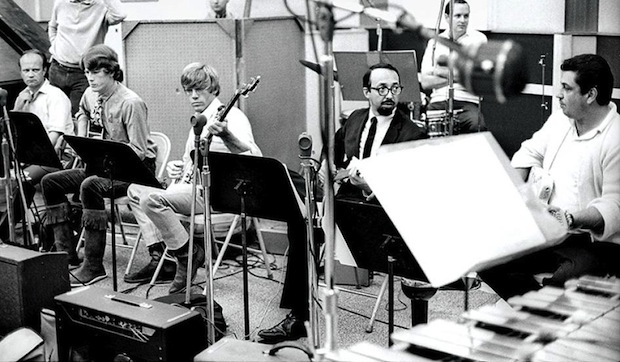 The Wrecking Crew, one of the most successful groups of studio musicians. (Image via newsweek.com)
The Wrecking Crew, one of the most successful groups of studio musicians. (Image via newsweek.com)
This article originally appeared on The Big Picture Music Production Blog.
When people think of studio musicians, they immediately think of great technique, but there are a number of other traits that you'll find common in all successful players who make their living in the studio. Here's an excerpt from The Studio Musician's Handbook (which I wrote with the great studio bass player Paul Ill) that takes a look at everything expected when you hire some for a studio gig.
A studio musician:
1. Has great chops
Studio musicians are expected to be creative, extremely versatile, and have a formidable skill set. They're usually the best musicians in town in terms of plain physical dexterity and are able to play numerous styles convincingly. Your ability to read music will determine the type of sessions on which you can play. For record dates, the ability to read and transcribe lead sheets is essential, but many other sessions, like jingles and television and movie scores, require expert sight reading.
[4 Practice Routine Tips to Progress Faster on Your Instrument]
2. Has great gear
A wide variety of gear in excellent working order is a must. Having only one sound makes for a boring recording, so the wider the variety of sounds you can get or the more you can double on other instruments, the more valuable you become.
3. Is easy to work with
Your reputation among other musicians and those in our industry who make the recordings is what gets you hired and keeps you working, so if other session musicians, producers, and engineers like you as a person, like how you play, and like the feeling you bring to a session, then you're more likely to get calls for work.
Smiles and a pleasant, accommodating attitude, as well as superb personal hygiene and an appropriate sense of style, go really far in the session business. There are a lot of great players out there and unless you're something unbelievably special, the people paying your check will always take the easiest to work with, all things being equal. No back-talk, no sass, no snide remarks, nothing other than a wide smile and a "tell me what you want," and "no problem!" attitude.
[Do You Have What it Takes to be a Session Musician?]
4. Has no ego
Everyone has their own idea of how they should sound, how the song should be played, how others should be playing it, and a host of other musical items both large and small. That all goes out the window when you're being hired to play on someone's recording.
You've got to have a thick skin while recording, and realize that even if the artist-producer-songwriter listens to your idea, it might not carry much weight or be acted upon. If they listen to you and actually use one of your suggestions, consider it a good day.
5. Takes criticism well
If you have a fragile ego, being a session musician is not for you. Except for the times when you're playing a written part, you can bet that every take is going to be listened to under a microscope and picked apart with a fine-tooth comb.
As difficult as that might seem, you can't take this personally because the artist-producer-songwriter only wants what's best for the song. You may play a part with a bitchin' feel, but if the sound isn't right and doesn't mesh with the track, chances are you'll do it again.
[Are Your Critics Right? How to Judge Your Own Work]
6. Uses proper studio etiquette
There's a way to do things in the studio and it differs from playing live. A studio musician's protocol exists, and you'll be expected to abide by it. There's an entire chapter dedicated to this in The Studio Musician's Handbook, but suffice it to say that if you like being the center of attention, studio work may not be for you.
Ready to step into the studio? Read all about how to get hired as a session musician.
Producer/engineer Bobby Owsinski is one of the best selling authors in the music industry with 23 books that are now staples in audio recording, music, and music business programs in colleges around the world, including The Mixing Engineer’s Handbook, Social Media Promotion for Musicians, Music 4.0: A Survival Guide for Making Music in the Internet Age, and more. He’s also a contributor to Forbes writing on the new music business, and he’s appeared on CNN and ABC News as a music branding and audio expert. Visit Bobby's music production blog, Music 3.0 music industry blog, Forbes blog, podcast, and website.


